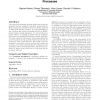Free Online Productivity Tools
i2Speak
i2Symbol
i2OCR
iTex2Img
iWeb2Print
iWeb2Shot
i2Type
iPdf2Split
iPdf2Merge
i2Bopomofo
i2Arabic
i2Style
i2Image
i2PDF
iLatex2Rtf
Sci2ools
115
click to vote
ATAL
2003
Springer
2003
Springer
Transition-independent decentralized markov decision processes
There has been substantial progress with formal models for sequential decision making by individual agents using the Markov decision process (MDP). However, similar treatment of multi-agent systems is lacking. A recent complexity result, showing that solving decentralized MDPs is NEXPhard, provides a partial explanation. To overcome this complexity barrier, we identify a general class of transitionindependent decentralized MDPs that is widely applicable. The class consists of independent collaborating agents that are tied together through a global reward function that depends upon both of their histories. We present a novel algorithm for solving this class of problems and examine its properties. The result is the first effective technique to solve optimally a class of decentralized MDPs. This lays the foundation for further work in this area on both exact and approximate solutions. Categories and Subject Descriptors I.2.11 [Artificial Intelligence]: Distributed Artificial Intellig...
ATAL 2003 | Decentralized Mdp | Keywords Decentralized Mdp | Transitionindependent Decentralized Mdps |
Related Content
| Added | 06 Jul 2010 |
| Updated | 06 Jul 2010 |
| Type | Conference |
| Year | 2003 |
| Where | ATAL |
| Authors | Raphen Becker, Shlomo Zilberstein, Victor R. Lesser, Claudia V. Goldman |
Comments (0)

